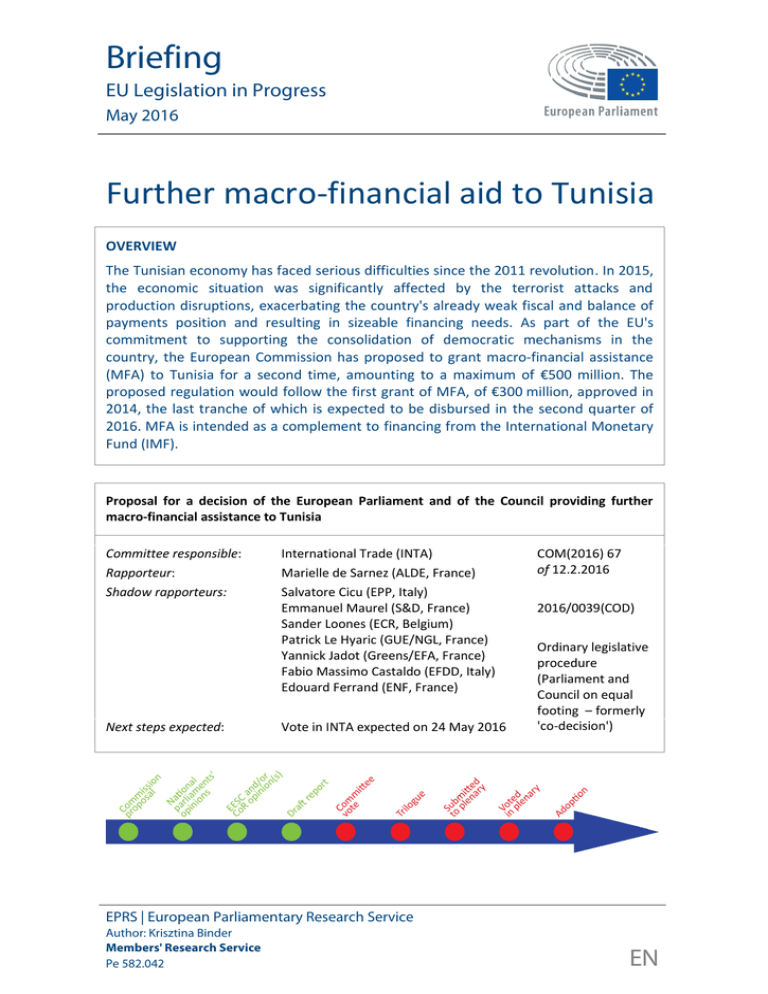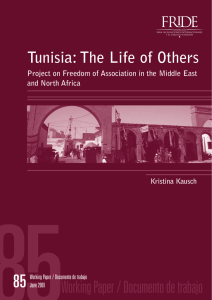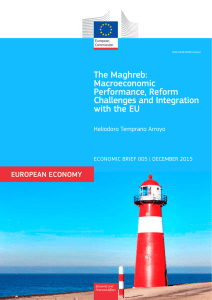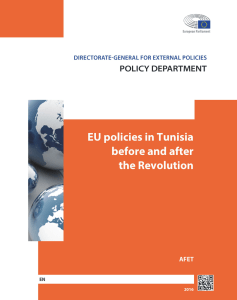increased its financial support - European Parliament
Anuncio

Briefing EU Legislation in Progress May 2016 Further macro-financial aid to Tunisia OVERVIEW The Tunisian economy has faced serious difficulties since the 2011 revolution. In 2015, the economic situation was significantly affected by the terrorist attacks and production disruptions, exacerbating the country's already weak fiscal and balance of payments position and resulting in sizeable financing needs. As part of the EU's commitment to supporting the consolidation of democratic mechanisms in the country, the European Commission has proposed to grant macro-financial assistance (MFA) to Tunisia for a second time, amounting to a maximum of €500 million. The proposed regulation would follow the first grant of MFA, of €300 million, approved in 2014, the last tranche of which is expected to be disbursed in the second quarter of 2016. MFA is intended as a complement to financing from the International Monetary Fund (IMF). Proposal for a decision of the European Parliament and of the Council providing further macro-financial assistance to Tunisia Committee responsible: Rapporteur: Shadow rapporteurs: Next steps expected: International Trade (INTA) Marielle de Sarnez (ALDE, France) Salvatore Cicu (EPP, Italy) Emmanuel Maurel (S&D, France) Sander Loones (ECR, Belgium) Patrick Le Hyaric (GUE/NGL, France) Yannick Jadot (Greens/EFA, France) Fabio Massimo Castaldo (EFDD, Italy) Edouard Ferrand (ENF, France) Vote in INTA expected on 24 May 2016 COM(2016) 67 of 12.2.2016 2016/0039(COD) Ordinary legislative procedure (Parliament and Council on equal footing – formerly 'co-decision') EPRS | European Parliamentary Research Service Author: Krisztina Binder Members' Research Service Pe 582.042 EN EPRS Further macro-financial aid to Tunisia Introduction On 12 February 2016, the European Commission adopted a proposal on providing further macro-financial assistance (MFA) to Tunisia. This MFA, together with the associated economic adjustment and reform programme, aims at enabling Tunisia to overcome short-term financing difficulties, while supporting policy measures intended to improve medium-term balance of payments and fiscal sustainability, and foster sustainable growth. Moreover, it endeavours to reinforce the government's commitment to implementing reforms and aspiration to deepen ties with the EU. Existing situation Since the revolution, the EU has increased its financial support to Tunisia, strengthening its cooperation in many fields. Tunisia has benefited since 2011 from over €1 billion in grants through the European Neighbourhood Instrument and other EU external cooperation instruments. Tunisia has also received over €1.3 billion in loans from the European Investment Bank since the start of the revolution. In addition, a first tranche of macro-financial assistance (MFA-I) was approved in May 2014 by the European Parliament and the Council. The original amount of €250 million, proposed by the European Commission, was raised by the co-legislators to €300 million. It complemented an arrangement between Tunisia and the International Monetary Fund (IMF), approved by the IMF Board in June 2013 and extended until December 2015. Following a request sent by the Tunisian Prime Minister to Commission President, JeanClaude Juncker, in August 2015, and reiterated in December by the Minister of Development Cooperation and Investment, the European Commission offered to provide Tunisia with a second tranche of MFA amounting to a maximum of €500 million. This assistance would complement a new IMF programme, which is currently still under negotiation. MFA-II would be an exceptional financial instrument to be implemented in 2016-2017. The financial impact is expected to develop between 2016 and 2019. The Commission would provide regular reports to the EP and the Council on developments regarding the macro-financial assistance. The new proposal on providing further macro-financial assistance supplements other recent measures to reassert the EU's support for Tunisia's economic and political reform process during a difficult period worsened by the 2015 terrorist attacks. The opening of the negotiations for a Deep and Comprehensive Free Trade Area agreement in October 2015 is a key element of the EU's commitment to support the democratic consolidation. Moreover, as an exceptional measure to bring short-term economic benefits to Tunisia, the EU has offered additional temporary access for Tunisian olive oil to the EU market. Economic difficulties Five years after the Arab Spring, Tunisia – greatly affected by instability in the surrounding region – is confronted with serious political, security and economic challenges. The social and political climate deteriorated in the second part of 2015. Moreover, in the absence of a strong reform agenda on the part of the government, much needed socio-economic reforms were not adopted in 2015. The economic consequences of the four major terrorist attacks in 2015 and 2016 further harmed the already weak economy, by affecting key economic sectors such as tourism and transport. According to official figures, the country lost more than a third of its tourism income last year. This is a significant loss, as tourism and transport both Members' Research Service Page 2 of 6 EPRS Further macro-financial aid to Tunisia contribute approximately 7% of GDP, with tourism accounting for around 15% of employment. Investment continues to be negatively affected by concerns regarding stability and risks of terrorism. Net foreign direct investment, which averaged almost 5% of GDP during 2005-2010, has declined to just over 2% of GDP in the last two years. Coupled with disruption in phosphate production, transport and other sectors, these developments have had a major impact on GDP growth, causing it to decline from 2.3% in 2014 to 0.8% in 2015, which is the lowest level since the revolution. With such low growth rates, no significant improvement can be expected in the field of unemployment, which continues to be high at 15%. The figures are particularly significant for the young and graduates (over 30%), and for women (21.6%).1 Nevertheless, Tunisia continues to make efforts to consolidate democratic mechanisms, and its democratic transition process is the most successful in the region. The EU remains Tunisia's largest trading partner (72.5% of exports to, and 64.7% of imports from the EU in 2014). The economic downturn in the European Union has negatively affected Tunisia's growth. Parliament's starting position The first macro-financial assistance to the Republic of Tunisia, in the amount of €300 million was adopted by the European Parliament and Council on 15 May 2014 (Decision No 534/2014/EU). The Parliament, by 488 votes to 51 with 17 abstentions, had adopted its legislative resolution at first reading on the proposal for a decision, on 16 April. Following a compromise reached with the Council, the Parliament amended the European Commission’s proposal, increasing the amount of macro-financial assistance from €250 million to €300 million. Moreover, it was stipulated that the constitution being drawn up by the National Constituent Assembly of Tunisia included some advances in the field of individual rights and freedoms, and gender equality. The draft report (rapporteur: Fabio Massimo Castaldo, EFDD, Italy) on EU relations with Tunisia in the current regional context, now being discussed in the Foreign Affairs Committee, welcomes the Commission's proposal for a second amount of €500 million in macro-financial assistance, and calls for its swift adoption. Council The Council conclusions of 20 July 2015 reaffirmed the EU's willingness to support Tunisia in its economic and political reform process. Preparation of the proposal The Union’s macro-financial assistance is exceptional in nature and is designed for partner third countries experiencing a balance-of-payments crisis. Therefore, the Commission did not carry out an impact assessment for this MFA proposal, as there is a political imperative to move ahead quickly in this emergency situation requiring a rapid response. An ex-ante evaluation statement accompanies the proposal. Having made a thorough assessment of the risks, the Commission services consider that there are sufficient grounds and guarantees to proceed with the proposed MFA for Tunisia. A detailed assessment of the satisfaction of the political criteria for MFA produced by the European External Action Service is annexed to the Commission's ex-ante evaluation statement. An ex-post evaluation of the proposed macro-financial assistance to Tunisia will be launched within two years of completion of the operation. Members' Research Service Page 3 of 6 EPRS Further macro-financial aid to Tunisia The changes the proposal would bring The proposal seeks to make MFA available to Tunisia in the form of medium-term loans at favourable financing conditions. The planned assistance, to be disbursed in three instalments (of €200 million, €150 million and €150 million, respectively) would contribute to overcoming the economy's short-term balance of payments and fiscal vulnerabilities, covering 19.2% of the estimated residual financing gap for the 20162017 period. It would also promote structural reforms to strengthen sustainable economic growth and to improve public finance management. The MFA would enhance the added value overall of EU involvement by increasing its effectiveness. Disbursements under the MFA-II operation would be conditional on successful programme reviews under the parallel IMF programme and on the effective drawing down by Tunisia of the funds available under the IMF financial arrangement. In addition, the Commission and the Tunisian authorities would agree on a specific set of structural reform measures, to be defined in a Memorandum of Understanding. The first MFA package supported the reform efforts in the following areas: public finance management; fiscal reforms to increase tax collection and improve the progressiveness of the tax system; strengthening the social safety net; financial sector reforms; and measures to improve the regulatory framework for trade and investment. Since 2004, a total of 16 ex-post evaluations have been carried out on macro-financial assistance operations. These evaluations conclude that MFA operations do contribute, albeit sometimes modestly and indirectly, to the improvement of external sustainability, macroeconomic stability and the achievement of structural reforms in the recipient country. In most cases, MFA operations had a positive effect on the balance of payments of the beneficiary country and helped to relax their budgetary constraints. They also led to a somewhat higher economic growth. National parliaments No Member State has submitted a reasoned opinion on the proposal. The subsidiarity deadline was 26 April 2016. Stakeholders' views In the preparation of the proposal, the Commission consulted with the IMF and the World Bank, which have already put in place sizeable financing programmes and are preparing new ones. The Commission consulted the Economic and Financial Committee on 10 December 2015, receiving an endorsement for the proposal. The Commission has also been in regular contact with the Tunisian authorities. Legislative process On 12 February 2016, the Commission adopted the legislative proposal and submitted it to the Parliament and to the Council. In the Parliament, the proposal was referred (on 25 February 2016) to the Committee on International Trade (INTA), as the responsible committee, and to the Foreign Affairs Committee (AFET) and the Committee on Budgets (BUDG), the two committees for opinion. On 15 March 2016, Marielle de Sarnez (ALDE, France) was appointed rapporteur for the INTA Committee. On 29 March 2016 a draft report, in which the rapporteur supported the Commission proposal and expressed the hope that this assistance programme will take effect as soon as possible to help Tunisia in these challenging times, was published. Members' Research Service Page 4 of 6 EPRS Further macro-financial aid to Tunisia On 4 April 2016, the INTA Committee, in the presence of Tahar Cherif, Ambassador of Tunisia, held an exchange of views on the Commission's proposal. The ambassador, after thanking the Parliament for its support for the introduction of the emergency autonomous trade measure for Tunisia in the form of an additional olive oil quota, briefly outlined the factors that led to the country's current situation. He said that taking into account the extent of the economic and social challenges and the ongoing reforms in Tunisia, the external financing needs are estimated at €5 billion. The MFA-II would contribute to partly cover these needs. He also expressed the hope that the first instalment will be disbursed before summer 2016. The rapporteur, Marielle de Sarnez pointed out that Tunisia faces multiple challenges and stressed that the country needs assistance, particularly from the European Union. She shared the hope that the disbursements would start as soon as possible, possibly before the summer. Tokia Saïfi (EPP, France) expressed support for Tunisia and the Tunisian people and underlined the importance of taking concrete measures to help the country. David Martin (S&D, UK) said that his group is supporting the Commission's proposal, while Helmut Scholz (GUE/NGL, Germany) and Klaus Buchner (Greens/EFA, Germany), although agreeing with the support of Tunisia, expressed doubts regarding whether the form of the assistance is appropriate, as it would increase the indebtedness of the country. Santiago Fisas Ayxelà (EPP, Spain) said that while the EU has to support Tunisia, Tunisia has to take the necessary measures, too. The representative of the Commission insisted on the urgency of the situation and stressed the importance of a swift adoption of the proposal, to allow the first instalment to be paid in July. The draft report was discussed during the meeting of 20 April 2016. On 27 April 2016, amendments were tabled in the committee. The committee vote is scheduled for 24 May 2016. The indicative date for discussion in plenary is 7 June 2016. In the meantime, the Council has also discussed the proposal at working party level. Despite reservations over the form of the Commission's proposal, and the possibility of it setting a precedent for future MFA proposals, the Member States' representatives were willing to agree the proposal without amendment, if that should also be the Parliament's position. This approach, if agreement is found between the EP and Council, would enable the funding to be put in place rapidly for Tunisia. Members' Research Service Page 5 of 6 EPRS Further macro-financial aid to Tunisia EP supporting analysis - Directorate General for External Policies, Policy Department, briefing on 'Tunisia: democracy challenged by economic and security crises', B. Rey, 2015. - Directorate General for Internal Policies, Policy Department D, Budgetary Affairs, study on 'The strategic impact and cost-effectiveness of EU budget support with regard to supporting democratic transitions in southern Mediterranean Countries' , M. van der Linde, A. Willemsen, 2013. - Directorate General for External Policies, Policy Department, study on 'EU macro-financial assistance: a critical assessment', R. Bendini, 2012. - EPRS At a Glance 'EU continues to assist Tunisia's transition', K. Binder, 2016. Other sources Further macro-financial assistance to Tunisia, European Parliament, Legislative Observatory (OEIL). Endnote 1 Over 28% of Tunisia's population is between 15 and 29 years of age. Youth and unemployment is a major social issue, especially for highly educated young workers. Tunisia’s overall unemployment rate spiked by 6% following the revolution, from 13% to 19%. For highly skilled youth, aged 15-29, the unemployment rate exceeds 44%, which is higher than before the 2011 revolution, reaching 40% in some of the less developed and less privileged parts of the country. Disclaimer and Copyright The content of this document is the sole responsibility of the author and any opinions expressed therein do not necessarily represent the official position of the European Parliament. It is addressed to the Members and staff of the EP for their parliamentary work. Reproduction and translation for noncommercial purposes are authorised, provided the source is acknowledged and the European Parliament is given prior notice and sent a copy. © European Union, 2016. [email protected] http://www.eprs.ep.parl.union.eu (intranet) http://www.europarl.europa.eu/thinktank (internet) http://epthinktank.eu (blog) Members' Research Service Page 6 of 6


